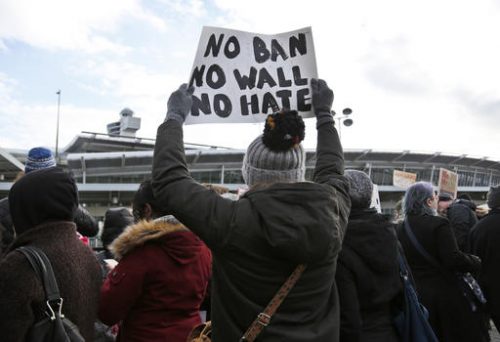After a week of tumult, Uber C.E.O. Travis Kalanick announced his decision to leave President Donald Trump’s advisory council on Thursday. The news comes after many on Twitter used the hashtag #BoycottUber to voice their displeasure with Uber’s decision to continue service to New York’s John F. Kennedy International Airport on Jan. 28 during a strike by taxicab drivers. Uber certainly isn’t a stranger to controversy, with many criticizing the company’s “surge pricing” strategy that hikes rates during peak hours and concerns over safety for passengers.

DePaul public relations professor Marshall Goldman says Uber needs to communicate they are “not anti-taxi,” but rather another “option to that traditional system.” Goldman said Uber receives a “bad rep” because of their attitudes towards other ridesharing companies, such as Lyft. Goldman said “even their name is ugly” in reference to Nazi Germany’s national anthem, “Deutschland Uber Alles.” Goldman said what Uber needs is a campaign “to make people start to feel better about them.”
Those on the left have long criticized Uber for their labor practices such as calling their drivers “independent contractors” rather than employees. In doing so, Uber does not have to provide benefits for their drivers, keeping costs for Uber low. This practice was challenged in court, but Uber was able to reach a settlement with the plaintiffs. Uber also faced criticism for what some have called “strong-arm tactics” in interactions with local politicians across the country. Uber famously fought with New York mayor, Bill de Blasio over regulations impacting the ride-sharing industry.
When asked for comment before Kalanick’s decision, Uber tried to repair some of the damage done by including information regarding a $3 million fund for those affected by the president’s immigration ban. Kalanick took to Facebook and Twitter calling the ban “unjust” and “against everything (Uber) stands for.” Molly Spaeth, an Uber employee, said the company is “mortified” consumers viewed Uber’s actions as trying to break the taxi strike.
However, the Uber is already feeling the impact of the boycott. According to the Chicago Tribune, Uber’s main competitor, Lyft has leapfrogged into first place among ridesharing apps. Lyft, in contrast, made a $1 million dollar contribution to the American Civil Liberties Union and released a statement in support of their drivers, many of whom are Muslim. Lyft, which has connections to the Trump White House through backers Carl Icahn and Peter Thiel, has avoided the scrutiny Uber has faced.
Lyft has largely grown on its ability to be a “nicer” ride-sharing company, whereas Uber uses its corporate structure to fight and battle for every political inch. Whether or not either strategy creates a better customer experience remains to be seen, but it does come into focus whenever a controversy like this arises.
This also ushers in a new era of corporate politics. Two companies with connections to refugees: Google and Apple took hardline stances against the ban. Apple, founded by the son of a Syrian refuge Steve Jobs, said the company “would not exist without immigration.” Google co-founder and Soviet refugee, Sergey Brin told a crowd of 2,000 Google employees he was “outraged by this order.”
Kalanick’s decision to step down from the advisory board may be too little, too late for Uber nearly a week after the protests. For companies like Uber, having a seat at the table comes with an inherent risk of backlash from the public. While Kalanick can put out public releases and distance himself from the decisions Trump makes, being linked to the administration is because enough for public uproar like Uber has seen over the past week.

Going forward, Uber will have to work to rehabilitate its image to get customers back. According to a Pew Research study conducted in 2016, 28 percent of people between 18-29 years old have used services such as Lyft and Uber and 7 percent of 18-29 year olds use these services on a daily or weekly basis.
Of that 28 percent of millennials who use Uber, 10 percent of them living in urban areas use it every day. This demographic tends to be more liberal or democrat-leaning than older generations. Therefore, Uber has risked alienating perhaps its largest user base, urban millennials, for roughly two weeks for sitting on President Trump’s advisory council.
Regarding Uber’s next steps, Goldman says Uber “needs to address their price-gouging strategy,” which he says “everyone hates.” However, it remains to be seen how far Uber is willing to go to win back the customers lost in the past week.
In the past, Uber has largely refused to concede ground during times of controversy, but this week’s protests may have done enough damage to Uber’s brand to force major changes within the company. However, since Uber isn’t publicly traded, Kalanick doesn’t have to deal with fluctuating stock prices nor a board of stockholders nervous about the future of the company.
Indeed, Uber’s decision to send drivers during a strike has done some damage to their brand, especially among those who use Uber the most. While it’s not yet clear what Uber will do going forward, it does not appear the battle between Uber and Lyft will end anytime soon.

